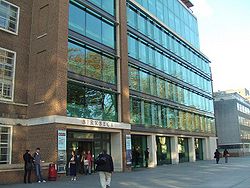Postsecularism and New Zealand in the 21st century

In 2008, the International Social Survey Programme was conducted in New Zealand by Massey University.[2] The results of this survey indicated that 72% of the population believed in the existence of God or a higher power, 15% are agnostic, and 13% are atheist (the survey had a 3% margin of error).[3] See: Irreligion in New Zealand

On December 28, 2018, the New Zealand Herald reported, "New data obtained by the Herald from the Department of Internal Affairs reveals that people born in India top the list of new citizens living in Auckland."[4]
According to the 2012 WIN-Gallup Global Index of Religion and Atheism report, 81% of Indians were religious, 13% were non-religious and merely 3% were convinced atheist.[5]
Jens Köhrsen, a professor for religion and economics at the Centre for Religion, Economy and Politics (ZRWP)[6], wrote:
| “ | [ Jürgen Habermas ] ...argues that a new age, the age of post-secularity, has begun. Previously vastly secularized societies, like the highly developed countries of Europe, Australia, New Zealand and Canada, would experience a new awareness of religion and attribute a new public role to religion. From now on, religion would constitute a relevant dialogue partner in the public debates of these societies (Habermas, 2008). Moreover, Habermas presents a normative argument about public religion: he recommends that post-secular societies should facilitate religious contributions to the public sphere. Religious reasoning could contribute to public debates about the ethical values of contemporaneous and future societies. Habermas believes that modern societies might find some answers to the moral questions of our time by listening to religion in public debates (Habermas, 2001, 2005, 2006, 2008). A similar position to that of Habermas is proposed by Leclerc (2001) and French sociologist Willaime (2004a, 2004b, 2005[1995]: 76-78, 2008). Willaime observes that even the highly secularized public and political sphere of France is exhibiting a new, more open attitude towards religion. The hypersecularity of France would stimulate a restructuration process of religion. According to Willaime, religion can form an important resource for public debates and be engaged in the identity construction process of individuals and collectives.[7] | ” |
Eric Kaufmann is a professor of politics at Birkbeck, University of London and author. His academic research specialty is how demographic changes affect religion/irreligion and politics.
In April 2010, Kaufmann, who is an agnostic, declared "the rate of secularisation has flattened to zero in most of Protestant Europe and France."[8] Kaufmann also declared that secularism "appears exhausted and lacking in confidence".[9]
On December 23, 2012, Kaufmann wrote:
| “ | I argue that 97% of the world's population growth is taking place in the developing world, where 95% of people are religious.
On the other hand, the secular West and East Asia has very low fertility and a rapidly aging population... In the coming decades, the developed world's demand for workers to pay its pensions and work in its service sector will soar alongside the booming supply of young people in the third world. Ergo, we can expect significant immigration to the secular West which will import religious revival on the back of ethnic change. In addition, those with religious beliefs tend to have higher birth rates than the secular population, with fundamentalists having far larger families. The epicentre of these trends will be in immigration gateway cities like New York (a third white), Amsterdam (half Dutch), Los Angeles (28% white), and London, 45% white British.[10] [11] |
” |

At a conference Kaufmann said of religious demographic projections concerning the 21st century:
| “ | Part of the reason I think demography is very important, at least if we are going to speak about the future, is that it is the most predictable of the social sciences.
...if you look at a population and its age structure now. You can tell a lot about the future. ...So by looking at the relative age structure of different populations you can already say a lot about the future... ...Religious fundamentalism is going to be on the increase in the future and not just out there in the developing world..., but in the developed world as well.[16] |
” |
See also: Growth of religious fundamentalism
For additional information, please see: 21st century New Zealand: Irreligion, religion and religious immigrants
Contents
New Zealand, its aging population and desecularization
See also: Desecularization and aging populations and New Zealand, its aging population and desecularization
The article Developed countries may become more religious in 20 years indicates:
| “ | Researchers from HSE University and RANEPA found that in high-income countries, age, rather than the cohort effect, has more impact on religiosity. They predict that this may have an impact on societal structure in the future. The study was published in Journal for the Scientific Study of Religion.
It has long been observed that older people tend to be more religious than younger people. However, it is still disputable whether this fact should be attributed to people generally becoming more religious with age per se (age effect), or to the process of secularization, wherein earlier cohorts (to which the now older people belong) used to be more religious than those that appeared later, i.e. younger cohorts (cohort effect). HSE University scholars decided to analyze this issue using data from six waves of the World Values Survey (2016) in high-income OECD countries. A total of 16 countries were studied, including Australia, the USA, Canada, Great Britain, Israel, New Zealand, Japan, Germany, as well as other European countries. The researchers used logistic models and multiple linear regression to determine that the age effect has a higher impact on religiosity than the cohort effect. Older people are more inclined to believe in God, attend church, and believe it is important to instill religion in children.. The cohort effect impacts other factors analyzed by the scholars, such as church attendance and a belief in religion's importance in life, but the age effect still strongly prevails over the cohort effect... The transition from religious to secular values may slow by 2040 in high-income OECD countries and, probably, there will be a resurgence of religiosity, the symptoms of which can be observed in Japan. On the other hand, widely divergent socio-cultural settings in different countries have an impact on religious behavior and attitude, and this must be taken into account in further research.[17] |
” |
Prime Minister Jacinda Adern gifts her Bible to movement at a Rātana church
In 2018, a New Zealand news website declared: "Prime Minister Jacinda Ardern speaks during centenary celebrations at Rātana Church in November. She gifted her Bible to the movement, saying it was a symbol of her promise to lead be a government that was kind and compassionate."[18] Jacinda Ardern is an agnostic.[19]
See also
Essay:
External links
References
- ↑ Irreligion in the Philippines, July 2018, "Irreligion in the Philippines is particularly rare among Filipinos...".
- ↑ "Religion In New Zealand: International Social Survey Programme" (PDF). Massey University.
- ↑ "Religion In New Zealand: International Social Survey Programme" (PDF). Massey University.
- ↑ Indians top list of Auckland's new NZ citizens, New Zealand Herald, December 28, 2018
- ↑ Global Index Of Religion And Atheism" (PDF). WIN-Gallup. Archived from the original (PDF) on 16 October 2012. Retrieved 3 September 2013.
- ↑ Prof. Dr. Jens Köhrsen, University website faculty page
- ↑ How religious is the public sphere? – A critical stance on the debate about public religion and post-secularity, Draft Version, Jens Koehrsen (Köhrsen). Bielefeld Graduate School in History and Sociology, Germany. École des hautes études en sciences socials, France. Published in: Acta Sociologica 55 (3), S. 273-288.
- ↑ Shall the religious inherit the earth? by Eric Kaufmann
- ↑ Shall the Religious Inherit the Earth?: Demography and Politics in the Twenty-First Century by Eric Kaufmann, Belfer Center, Harvard University/Birkbeck College, University of London
- ↑ London: A Rising Island of Religion in a Secular Sea by Eric Kaufmann, Huffington Post, 2012
- ↑ 97% of the world's population growth is taking place in the developing world, where 95% of people are religious, Tuesday, April 30, 2013
- ↑ Shall the Religious Inherit the Earth?: Demography and Politics in the Twenty-First Century by Eric Kaufmann, Belfer Center, Harvard University/Birkbeck College, University of London
- ↑ Eric Kaufmann: Shall The Religious Inherit The Earth?
- ↑ Eric Kaufmann's Atheist Demographic series
- ↑ Eric Kaufmann: Shall the Religious Inherit the Earth?, Australian Broadcasting Corporation
- ↑ Eric Kaufmann - Religion, Demography and Politics in the 21st Century
- ↑ Developed countries may become more religious in 20 years, Eureka Alert
- ↑ Godless NZ? Not entirely - we're actually becoming a more Christian nation by Martin van Beynen, Dec 29, 2018, www.stuff.co.nz
- ↑ Knight, Kim (January 29, 2017). "The politics of life: The truth about Jacinda Ardern". The New Zealand Herald.